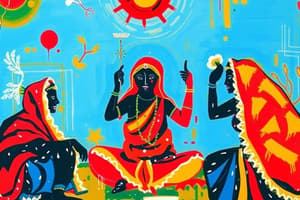Podcast
Questions and Answers
What was the outcome of the negotiations between the Congress and the Muslim League in 1927?
What was the outcome of the negotiations between the Congress and the Muslim League in 1927?
- The negotiations failed due to disagreements on representation (correct)
- The Congress agreed to separate electorates
- The two parties formed an alliance
- The Muslim League joined the Civil Disobedience Movement
What was Muhammad Ali Jinnah willing to give up in exchange for reserved seats in the Central Assembly?
What was Muhammad Ali Jinnah willing to give up in exchange for reserved seats in the Central Assembly?
- Reserved seats in the Muslim-dominated provinces
- Separate electorates (correct)
- The demand for a separate Muslim state
- Representation in proportion to population in the Central Assembly
What was the atmosphere between the Hindu and Muslim communities when the Civil Disobedience Movement started?
What was the atmosphere between the Hindu and Muslim communities when the Civil Disobedience Movement started?
- One of suspicion and distrust (correct)
- One of open conflict
- One of negotiation and compromise
- One of unity and cooperation
Who opposed efforts at compromise in the All Parties Conference in 1928?
Who opposed efforts at compromise in the All Parties Conference in 1928?
Why were many Muslims alienated from the Congress?
Why were many Muslims alienated from the Congress?
What was the concern expressed by many Muslim leaders and intellectuals?
What was the concern expressed by many Muslim leaders and intellectuals?
What was Sir Muhammad Iqbal's justification for separate electorates for Muslims?
What was Sir Muhammad Iqbal's justification for separate electorates for Muslims?
What did Sir Muhammad Iqbal disagree with in his 1930 statement?
What did Sir Muhammad Iqbal disagree with in his 1930 statement?
What did Hindus think was contrary to the spirit of true nationalism?
What did Hindus think was contrary to the spirit of true nationalism?
What was unique about India, according to Sir Muhammad Iqbal?
What was unique about India, according to Sir Muhammad Iqbal?
What was the outcome of Sir Muhammad Iqbal's 1930 statement?
What was the outcome of Sir Muhammad Iqbal's 1930 statement?
What did Sir Muhammad Iqbal mean by 'communalism in its higher aspect'?
What did Sir Muhammad Iqbal mean by 'communalism in its higher aspect'?
What was the main goal of the Khilafat Committee formed in Bombay in March 1919?
What was the main goal of the Khilafat Committee formed in Bombay in March 1919?
What was Mahatma Gandhi's view on how to achieve swaraj?
What was Mahatma Gandhi's view on how to achieve swaraj?
What was the significance of the Calcutta session of the Congress in September 1920?
What was the significance of the Calcutta session of the Congress in September 1920?
What was one of the initial steps proposed by Gandhi in the non-cooperation movement?
What was one of the initial steps proposed by Gandhi in the non-cooperation movement?
What was the significance of Gandhi's book 'Hind Swaraj'?
What was the significance of Gandhi's book 'Hind Swaraj'?
What was the ultimate goal of the non-cooperation movement, according to Gandhi?
What was the ultimate goal of the non-cooperation movement, according to Gandhi?
Flashcards are hidden until you start studying




